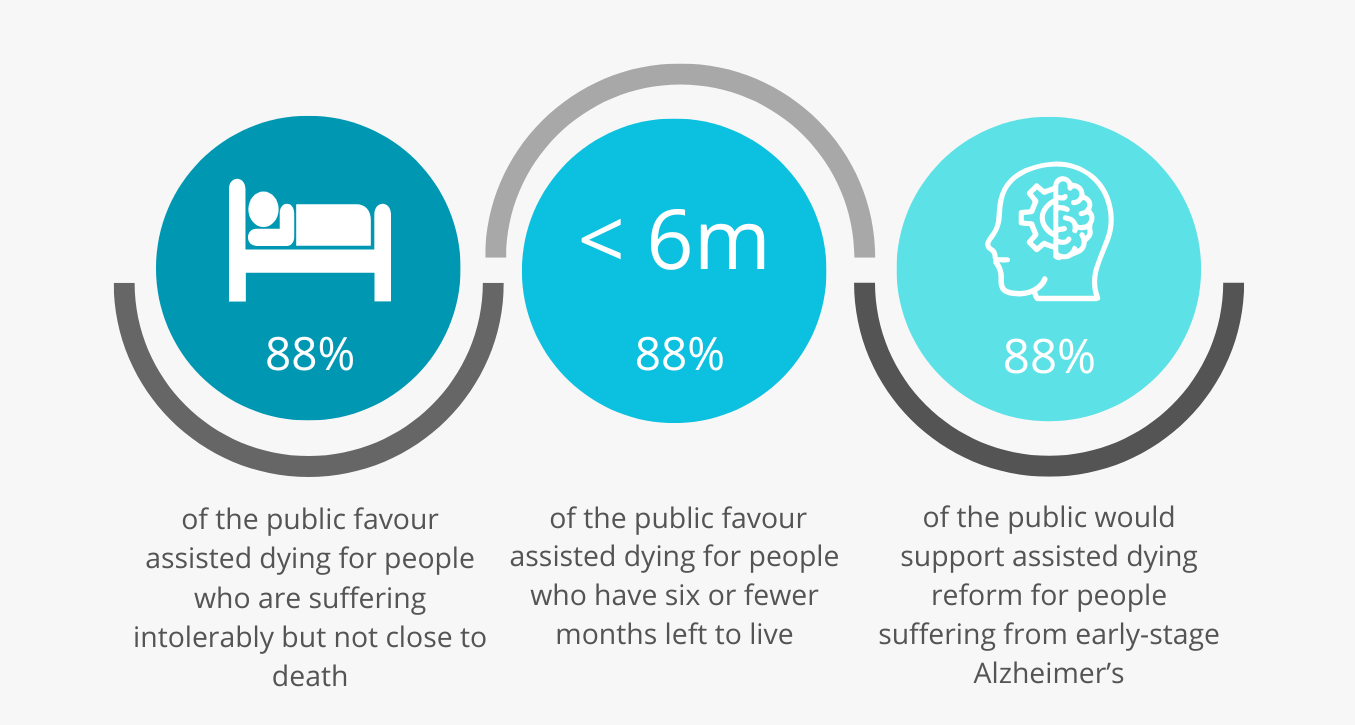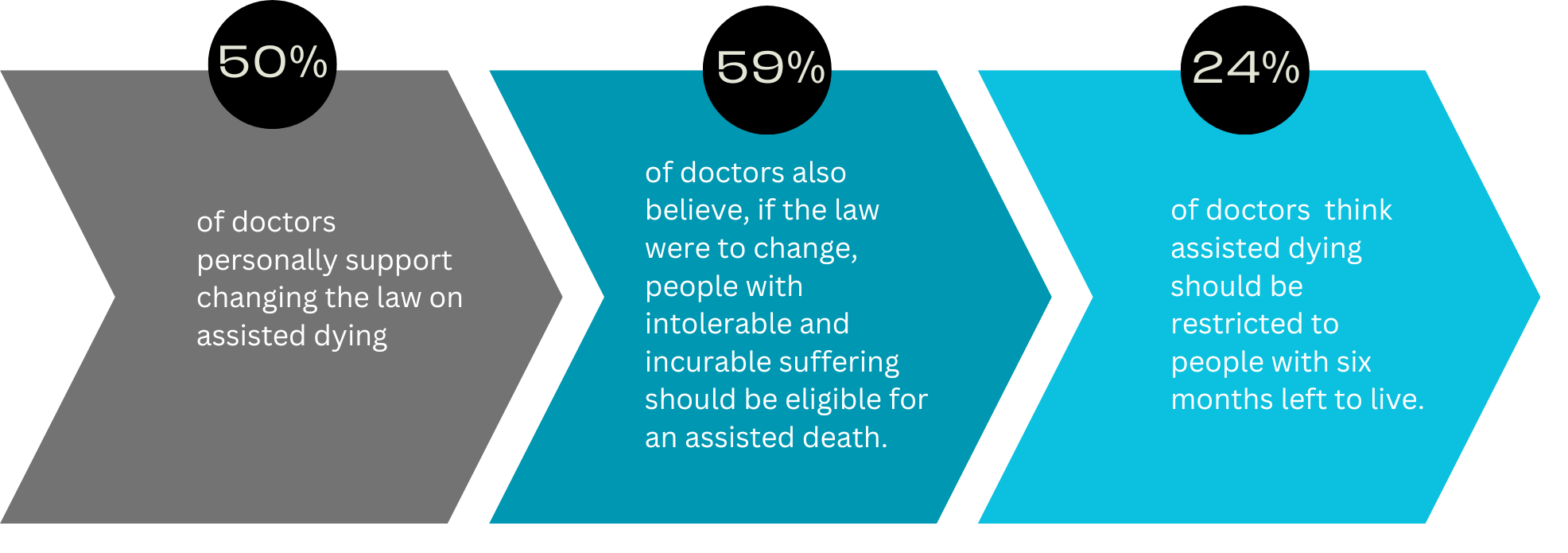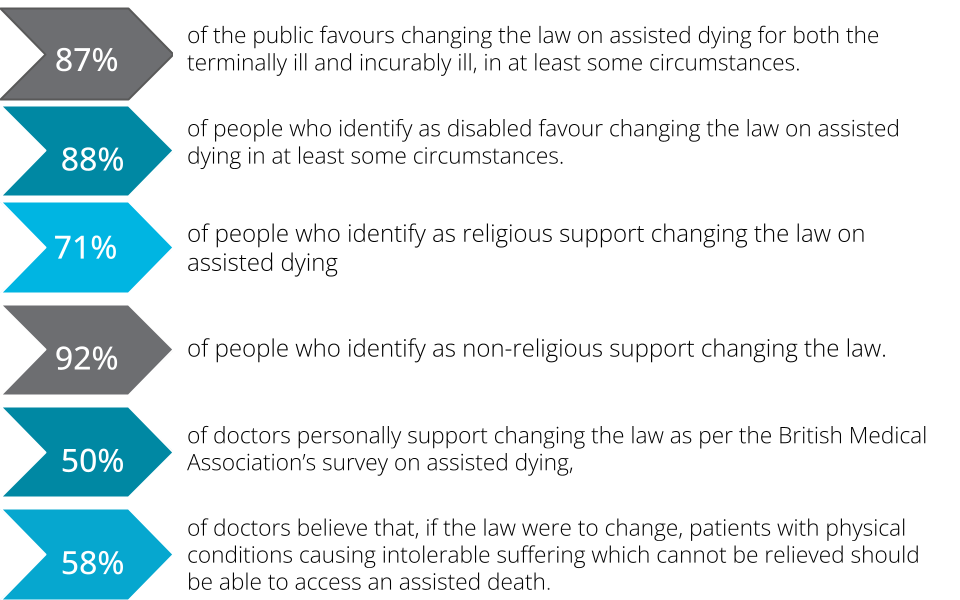PUBLIC OPINION
In 2015, only 18% of MPs voted in favour of assisted dying reform. In the years since, popular support for a change in the law has dramatically changed.

In the UK, public opinion favouring assisted dying reform for the intolerably suffering has dramatically shifted. In 2014 according to YouGov only 42% of the public supported assisted dying for people who are intolerably suffering, but not close to death. Conversely, a NatCen survey, published in 2019, found that up to 88% of the public favoured changing the law for the intolerably suffering.
OPINION FROM DISABLED COMMUNITIES
- 88% of people who identify as disabled support assisted dying reform for people who are intolerably suffering
- 89% of people who identify as disabled support assisted dying reform for people suffering from early-stage Alzheimer’s.
In 2013, research conducted by the Picker Institute Europe, on behalf of the Motor Neurone Disease Association, found that 69% of people with MND think ‘deciding when the time is right to die’ is what it means to have control at the end of life, and 45% of people suffering from MND would want the option to consider assisted dying if the law were changed.
In 2020, an independent study of disability rights groups found that the vast majority of organisations advocating on behalf of disabled people are neutral or have no stance on assisted dying reform, including:
- The Motor Neurone Disease Association
- Parkinson’s UK
- The Alzheimer’s Society
- The Multiple Sclerosis Society.
Only 5 out of 140 UK based organisations oppose changing the law.
OPINION FROM RELIGIOUS AND NON-RELIGIOUS GROUPS
As with others in society, the vast majority of people who are religious support a change in the law that would respect the choices of both those who are incurably suffering or terminally ill.
- 71% of religious people support assisted dying reform
- 92% of the non-religious support assisted dying reform.
MEDICAL OPINION

Although a minority of medics conscientiously object to assisted dying reform, the vast majority want a law that would allow their patients to die with dignity.
This is reflected in the neutral positions of almost every high profile medical organisation, including:
- The Royal College of Physicians
- The Royal Society of Medicine
- The Royal College of Nursing
- The Royal College of Psychiatrists.
In 2020, in a survey of more than 29,000 doctors, the British Medical Association found that 40% of doctors also think the BMA should actively support assisted dying reform, 21% think the BMA should adopt a neutral stance, and only 33% think the BMA should remain opposed to assisted dying.
KEY STATISTICS
UK CITIZENS AND SWITZERLAND
- At least one British citizen per week travels to Switzerland for an assisted death; – a six fold rise since 2005.
- On average an assisted death in Switzerland costs over £12,000.
- Over 1,500 UK citizens are members of a Swiss assisted dying organisation.
MEDICAL, DISABILITY, AND PUBLIC OPINION

- 87% of the public favours changing the law on assisted dying for both the terminally ill and incurably ill, in at least some circumstances.
- 88% of people who identify as disabled favour changing the law on assisted dying in at least some circumstances.
- 71% of people who identify as religious support changing the law on assisted dying.
- 92% of people who identify as non-religious support changing the law.
- 50% of doctors personally support changing the law as per the British Medical Association’s survey on assisted dying,
- 58% of doctors believe that, if the law were to change, patients with physical conditions causing intolerable suffering which cannot be relieved should be able to access an assisted death.
WORLDWIDE LEGAL ASSISTED DYING
- More than 400 million people around the world have a legal right to die.
- Assisted dying accounts for 4% of deaths in Canada.
- In Canada, the vast majority of people have an assisted death because they’re less able to engage in enjoyable life activities (82.1%), are in severe pain (56.4%), or worried about their loss of dignity (53.3%).
- In Oregon, on average a third of people approved for assisted deaths decide not to take their life-ending medication. In most cases, that’s because having the security of knowing they can end their suffering if it ever became too much to bear is enough.
PALLIATIVE CARE AND ASSISTED DYING
- According to the Office of Health Economics, in the UK, even if every dying person who needed it had access to good quality palliative care, 6,394 people per year would still have no effective pain relief in the final three months of their life.
- In Canada, 78% of people who requested assisted deaths received palliative care.
- Dementia is the leading cause of death in the UK, accounting for 1 in 8 of all deaths. However, less than 1% of patients in inpatient hospices suffer from dementia in the UK.
VULNERABLE PEOPLE
- 45% of UK doctors believe that some healthcare professionals already assist their patients to end their life; it is estimated that around 1,000 people are helped to die every year illegally.
- It is estimated that at least 30% of overseas assisted deaths are unknown to the police.

